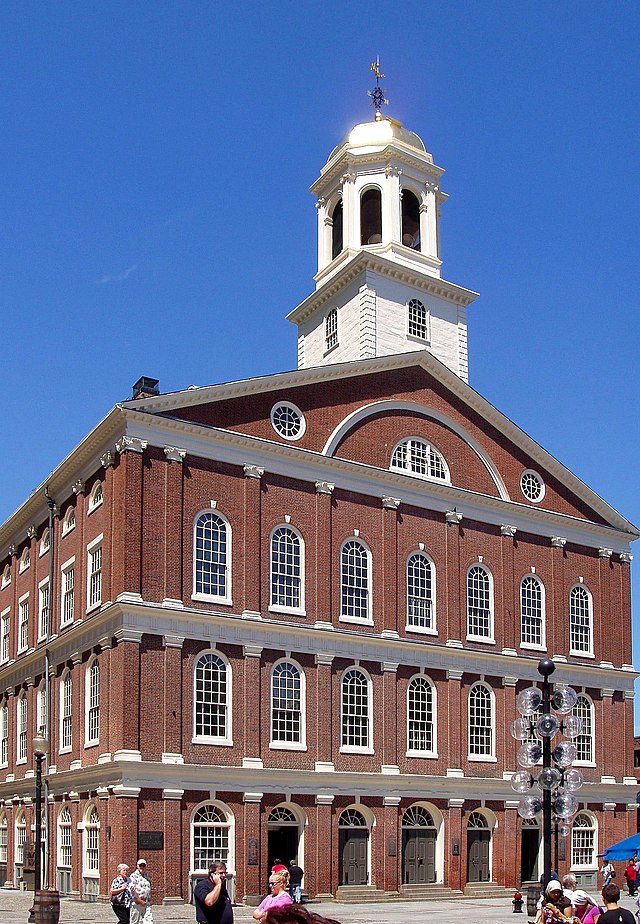,_The_Bostonians_Paying_the_Excise-man,_or_Tarring_and_Feathering_(1774)_-_02.jpg) |
Engraving of a British official being tarred
and feathered at Boston's Liberty Tree |
Boston's Liberty Tree -
an elm tree that once stood roughly where the Chinatown T Stop is today - has long been recognized as a major symbol in the American Revolutionary. A rallying point for the South End Gang for the Pope's Day "festivities," which often led to violence against their North End counterparts and always with the destruction of anti-Catholic effigies, during the Stamp Act Crisis of 1765 it became a potent symbol of the nascent Patriot movement, as well documented by
historian Alfred Young.
It is thus no surprise that the Liberty Tree became a target of destruction during the British occupation of Boston in 1775. According to a report in the
Connecticut Courant on September 4, 1775, a group of soldiers led by a Job Williams, with the blessing of General Thomas Gage, "made a furious Attack upon" the famous elm. "After a long spell of laughing and grinning, sweating, swearing and foaming, with Malice diabolical, they cut down a Tree, because it bore the Name of Liberty."
While the destruction of the Liberty Tree could be construed as a significant symbolic blow to Boston's Patriot cause, the
Courant dismissed the tree's demise as a setback, so long as "the GRAND AMERICAN TREE OF LIBERTY, planted in the center of the United Colonies of North-America, now flourishes with unrivalled, increasing beauty." The Liberty Tree had transcended its physical form, instead becoming an American revolutionary ideal.
This sentiment of the Liberty Tree as an undying symbol of the Patriot cause was echoed in the September 6 issue of Isaiah Thomas'
Massachusetts Spy, in which the following poem appeared:
In a chariot of light from the regions of day,
the goddess of liberty came;
Ten thousand celestials directed the way,
And hither conducted the dame.
A fair budding branch from the gardens above,
Where millions with millions agree,
She brought in her hand, as a pledge of her love,
And the plant she named Liberty Tree.
The celestial exotic stuck deep in the ground,
Like a native it flourish'd and bore,
The fame of its fruit drew the rations around,
To seek out this peaceable shore.
Unmindful of names or distinctions they came,
For freemen like brothers agree,
With one spirit endu'd, they one friendship pursu'd,
And their temple was Liberty Tree.
Beneath this fair tree, like the patriarchs of old;
Their [illegible] in contentment they eat,
Unvex'd with the troubles of silver and gold,
The cares of the grand and the great.
With timber and tar they Old England supply'd,
And supported her pow'r on the sea;
Her battles they fought, without getting a groat,
For the honour of Liberty Tree.
But hear, O ye swains, ('tis a tale most profane)
How all they tyrannical powers,
King, Commons, and Lords, are uniting amain,
to cut down this guardian of ours;
From the east to the west, blow the trumpet to arms,
Thro' the land let the sound of it flee,
Let the far and the near - all unite with a cheer,
In defence of our Liberty Tree.
While the physical Liberty Tree had already been destroyed, the symbol became one in which the Patriots rallied around. While Gage's men were able to remove the tree itself, they very likely increased the tree's potency and the Boston Patriots' resolve to oppose the crown.





,_The_Bostonians_Paying_the_Excise-man,_or_Tarring_and_Feathering_(1774)_-_02.jpg)

